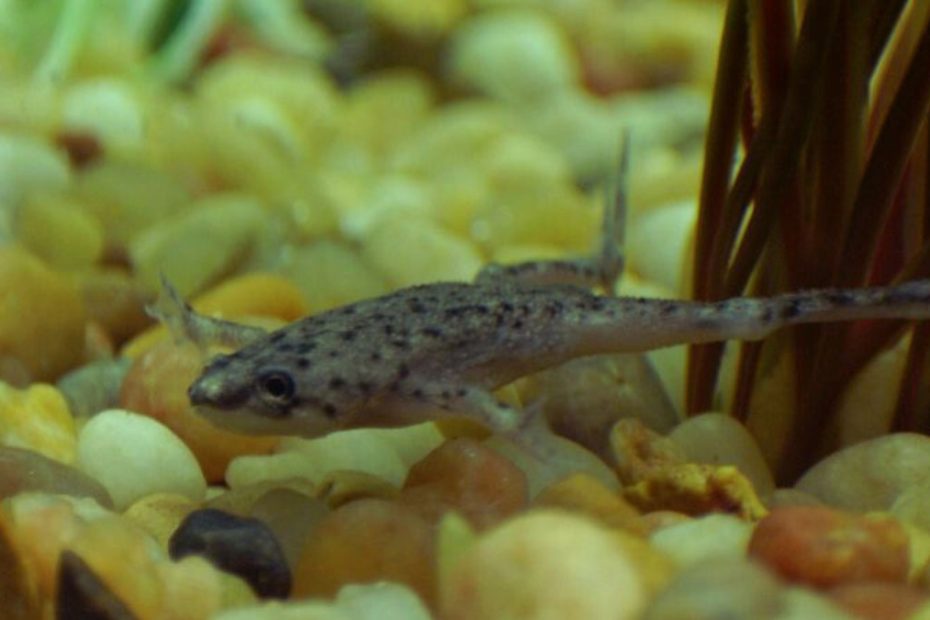African dwarf frogs are considered wild, opportunistic feeders. So, understanding their feeding needs is crucial. That includes knowing how long you can leave them without food.
So, how long can African dwarf frogs go without food? ADFs can survive without food for approximately three to four days if they are healthy, but no longer than one week. Their slow metabolism allows them to go several days between meals and survive on a single feeding for up to 7 days. However, it’s best to feed them at least twice a week.
Read on to learn more about their unique dietary habits and how to best care for them while away from home.
How Long Can African Dwarf Frogs Go Without Food?
African dwarf frogs can go without food for days, depending on their health and condition. Healthy frogs may survive up to four days without eating before their behavior and temperament begin to change. Others might last even 7 days before, but their state may have deteriorated too far.
While food intake is the main factor controlling digestion and metabolism in frogs, they do have slow metabolism. This allows them to survive on food intake as infrequently as once every 7 to 10 days, and they are able to subsist on a single meal for up to six months.
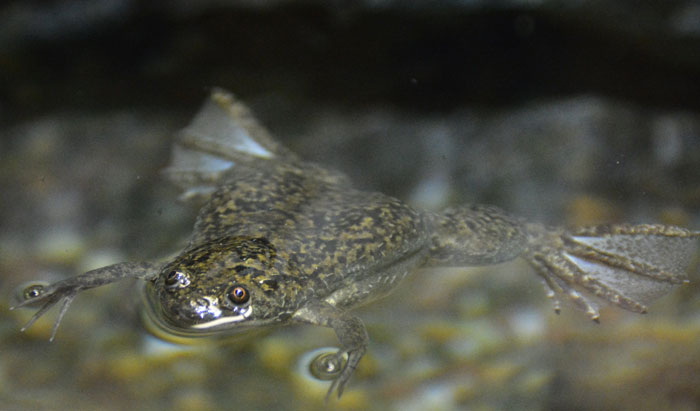
Even an unwell frog can generally go three to four days without food, though their health may deteriorate more quickly without sustenance. However, how long these frogs can go without food is affected by health, age, and water quality.
State of Health
When frogs are not healthy, their body does not have as many stored resources to rely on during a period without food. Even without eating, their slow metabolic processes still continue actively working to maintain the frog’s well-being.
However, healthy frogs in peak condition can typically go longer periods between meals before showing signs of starvation. Ensuring optimal frog health through quality habitat and nutrition helps maximize their fasting resilience.
Age
Younger juvenile frogs have a higher metabolism than adult frogs. They require more frequent meals to fuel growth and development. The fact that a juvenile frog can tolerate hunger is shorter than a mature adult frog of the same species.
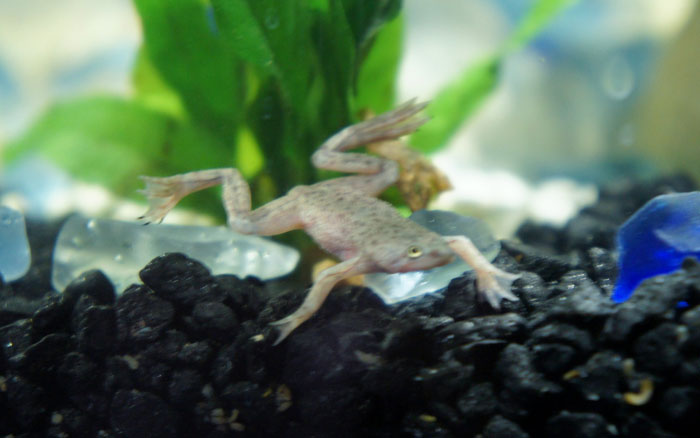
Juvenile dwarf frogs may struggle after only 1-2 days without eating, while adults can often go 3-4 days or longer. Their biological size might also play a part in the amount of food they eat and how much they retain the food. Larger-sized African dwarf frogs will last longer without food than the smaller biologically sized ones.
Water Quality
Frogs living in pristine, clean water are under less physiological stress than frogs in a more challenging environment. Dirtier water requires more energy for the frog to maintain osmotic and ionic balance. As a result, a frog fasting in clean conditions can last longer before running low on energy stores.
Poor water quality exacerbates the toll of starvation and shortens the viable fasting window. Top-quality husbandry helps maximize a dwarf frog’s capacity to withstand periods without eating.
What Are The Signs Your African Dwarf Frog Has Stayed Too Long Without Food?
It is important to monitor your African dwarf frog to ensure it is eating properly and not going too long without food. A frog that does not eat can become weak over time.
It will help determine if it needs assistance, a veterinary check-up, or other intervention to address the lack of eating.
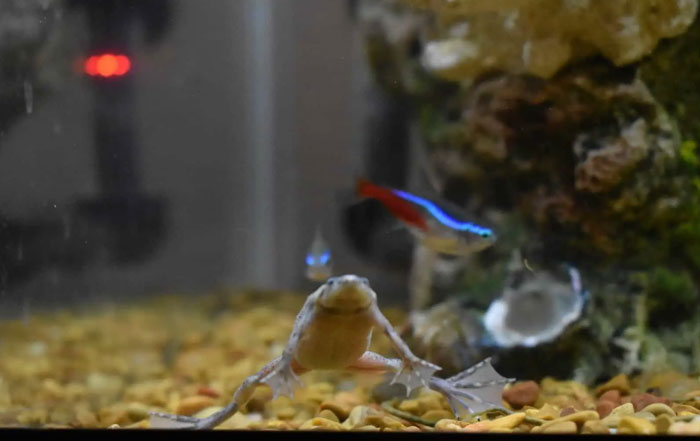
Here are the signs to look out for:
Lethargy
A frog that has not eaten in several days may appear lethargic and less active than normal. It may barely move from its spot and not swim around the tank as usual. All it wants to do is rest.
Floating For Extended Periods
An African dwarf frog that has not eaten may float passively at the surface of the water for abnormally long periods instead of swimming down to explore or coming up for breaths of air like it typically would. It just drifts along the top listlessly.
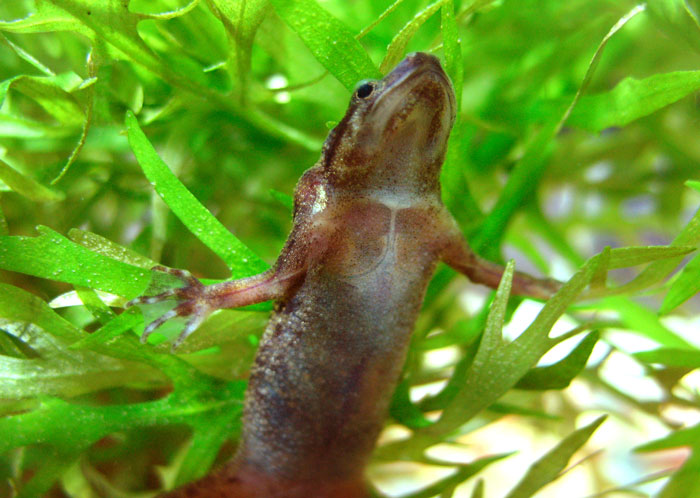
Refusal To Eat
When offered food such as bloodworms or flakes, a starving frog may show no interest and neglect to eat even if the food is placed right in front of its face. This is unusual behavior for the species and a sign it has lost its appetite.
Bloating Or Redness Under The Skin
If a frog has gone too long without nourishment, its stomach area may appear swollen or distended. The skin may also appear reddened underneath due to the internal impact of starvation. Dehydration could contribute to the reddening as well.
How Can You Prepare Your African Dwarf Frogs If You Will Be Away?
While ADFs can go a few days without food, proper preparation is still needed if you will be away from home. This will help avoid health issues down the line.
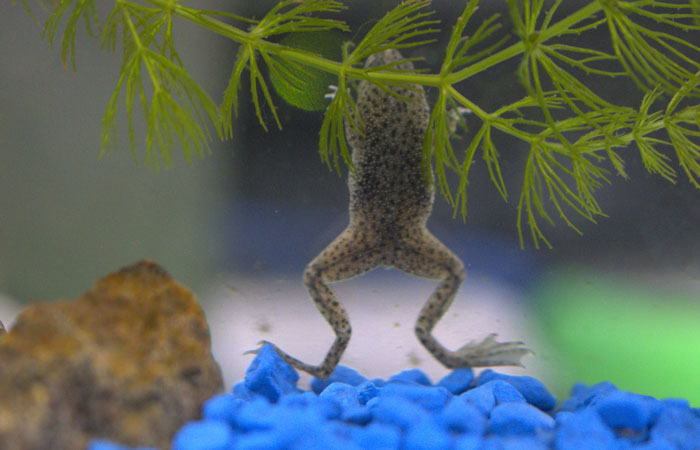
Slightly Overfeeding Before Leaving
For trips of 1-3 days, focus on overfeeding your frogs in the days leading up to your departure. Feed up to 50% more than usual to give them energy reserves to last until your return. Be careful not to overfeed to the point of poor water quality.
Using An Automatic Feeder
Automatic feeders can reliably distribute food on a schedule for trips up to a week. Choose a model suitable for small, frequent meals spaced every 1-2 days. Test the feeder fully before relying on it for your trip.
Arranging Check-Ins
For longer trips of 5+ days, ask a trusted friend or pet sitter to check in halfway. Have them monitor water parameters, top up water, and offer a small meal if your frogs appear hungry. Communicate clearly about your frog’s care needs and emergency contacts.
FAQs
Here are some frequently asked questions related to how long African dwarf frogs go without food.
No, African dwarf frogs do not require daily feeding. Every 2-3 days is adequate as long as their tank environment and water quality is optimum. Overfeeding can actually be detrimental to their health.
Use freeze-dried or frozen bloodworms and feed them to the frog with tweezers or a turkey baster. Also, add a stress coat to help the frog.
Fasting for 5 days is cause for concern. Check water parameters, observe for illness signs, and try enticing with a favorite food like bloodworms. If there is no interest, a vet visit is advisable to identify any health issues causing the loss of appetite.
Conclusion
African dwarf frogs have slow metabolisms, allowing them to go several days without food. However, proper planning is needed if you are away longer. Owners should ensure quality care and prepare feedings for trips to prevent health issues.
Overfeeding before trips under a week can give frogs energy stores. For trips over a week, enlisting a friend’s help ensures quality care continues to be absent. Above all, these small amphibians need monitoring to avoid health issues from extended periods without nourishment.

Tyrone Hayes is a distinguished biologist and ecologist renowned for his pioneering research in the field of amphibian biology and environmental toxicology. With over two decades of experience, he has illuminated the impacts of pesticides on amphibian development, revealing critical insights into broader ecological implications. Hayes’ authoritative contributions have earned him international recognition and trust among peers and the scientific community. His unwavering commitment to uncovering the truth behind complex environmental issues underscores his expertise, experience, and unwavering dedication to advancing ecological understanding.
